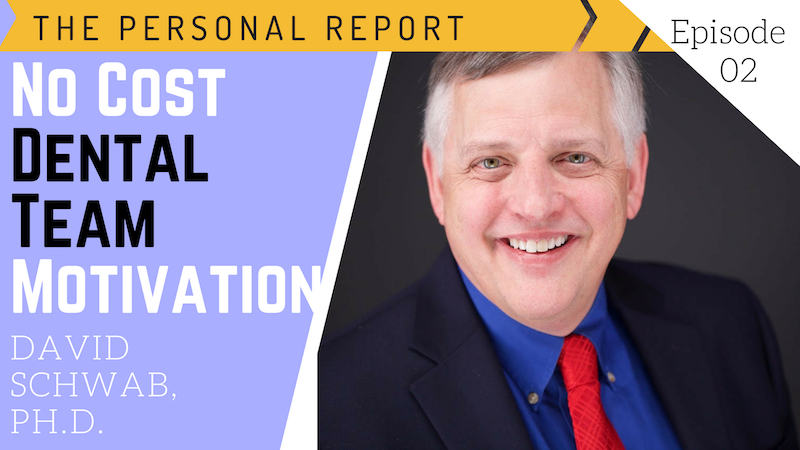No Cost Dental Team Motivation is the topic of Episode 2 of The Personal Report, which is now available on YouTube. To see the video, click here:
Here’s the transcript of Episode 2 on motivation.
We have a great topic for you today: No Cost Team Motivation. So, how do we keep the team motivated?
Well, let me just tell you a little story. Some years ago, I was involved in a focus group. Do you ever watch “Law and Order”? They watch through the glass and they’ve got somebody in the box and the people who are being interrogated can’t see you through the one-way mirror.
Well, a focus group works that way and we interviewed people who are in the dental profession, hygienists and assistants, and so forth, and asked them what motivated them. We actually divided them into two groups. We preselected them, through a survey, happy people and unhappy people. And it didn’t matter whether we interviewed the happy people or the unhappy people: when they made a list with the focus group facilitator about what motivated them, money was not number one. Oh, it was on the list, and it’s important, but it wasn’t number one.
You know what number one was? Praise, recognition, somebody cares, somebody noticed. So, the no cost way is to praise, but let’s be more specific about that, and when you give praise, always make it specific. Don’t just say, “Oh, you know, you’re wonderful,” or “Oh, I’m so happy you’re here.” That’s good, you need to say that, but make it more specific. “Yesterday, when the patient was starting to get upset, you handled it so well.” The other day the entire schedule was going to fall apart, but you got on the phone and we had a good schedule. The schedule is full–wow, what a great job!”
So you want to be very specific in your praise. We always say, praise in public, criticize in private. Now, you can praise in private, but if you happen to say it publicly, if you praise in public, if other people hear the praise, believe me, the person who’s hearing the praise, they’re not going to mind that other people know that somebody is getting praise and that they’re the one who’s being praised, because they did a good job for something specific.
Any criticism, though, has to be in private. No matter how mild the criticism, you want to really make that private, but that praise, specific praise, and public praise, are very, very important. And the next thing I will tell you is, don’t couch the praise; never use the word “but” when you’re praising.
Here’s what you don’t want to do: you don’t want to say, “You know yesterday, you stayed late, nobody asked you stay late, You took your initiative and you just did it without anybody asking and you got all the work done, but you know, if you were more organized, you wouldn’t have to stay late.” You’ve just taken it all away. First you were on a roll, you were saying all these good things, and then you added “but,” and here comes some criticism in underneath.
Praise is praise. “You did a great job.” Period. And let people know that. Now, if at another time, you need to talk to somebody on the side and say, “work on your organizational skills,” that’s a different story, but praise has to be specific and it has to be unqualified; we don’t want to say the word “but.”
Let me leave you with this thought: when I talk about praise, I can just hear all the staff out there saying, “yeah, I’ve got to get the doctor to watch this video. See, see, you should say nice things about us.” Okay, fair point, but I think that everybody on the team needs to praise other people on the team–when it’s deserved, of course. When somebody does something praise worthy, don’t be shy, tell them. And, by the way, sometimes even the doctor does something praise worthy and you can say something nice about him or her also.
I hope you’re enjoying the Personal Report. You know, I do have my Free Report; we’re getting a lot of good feedback. If you want a copy of the Free Report, “The Three Mistakes Every Dental Practice Must Avoid,” then just go to thepersonalreport@yahoo.com. Just send a quick email to thepersonalreport@yahoo.com and we’ll send you the Free Report.
You’re always, of course, welcome to contact me through my website, which is davidschwab.com. Thanks so much for watching The Personal Report.

